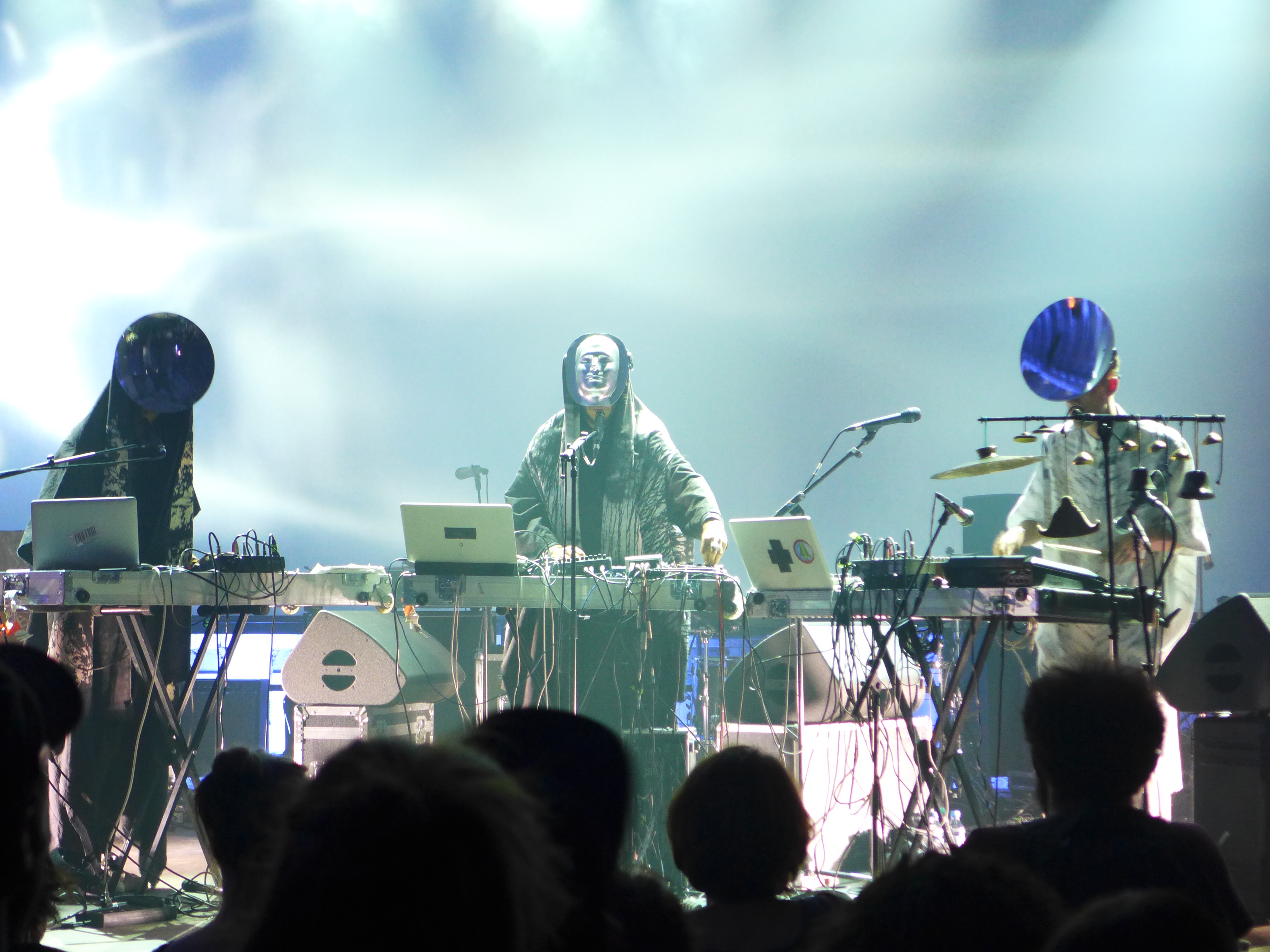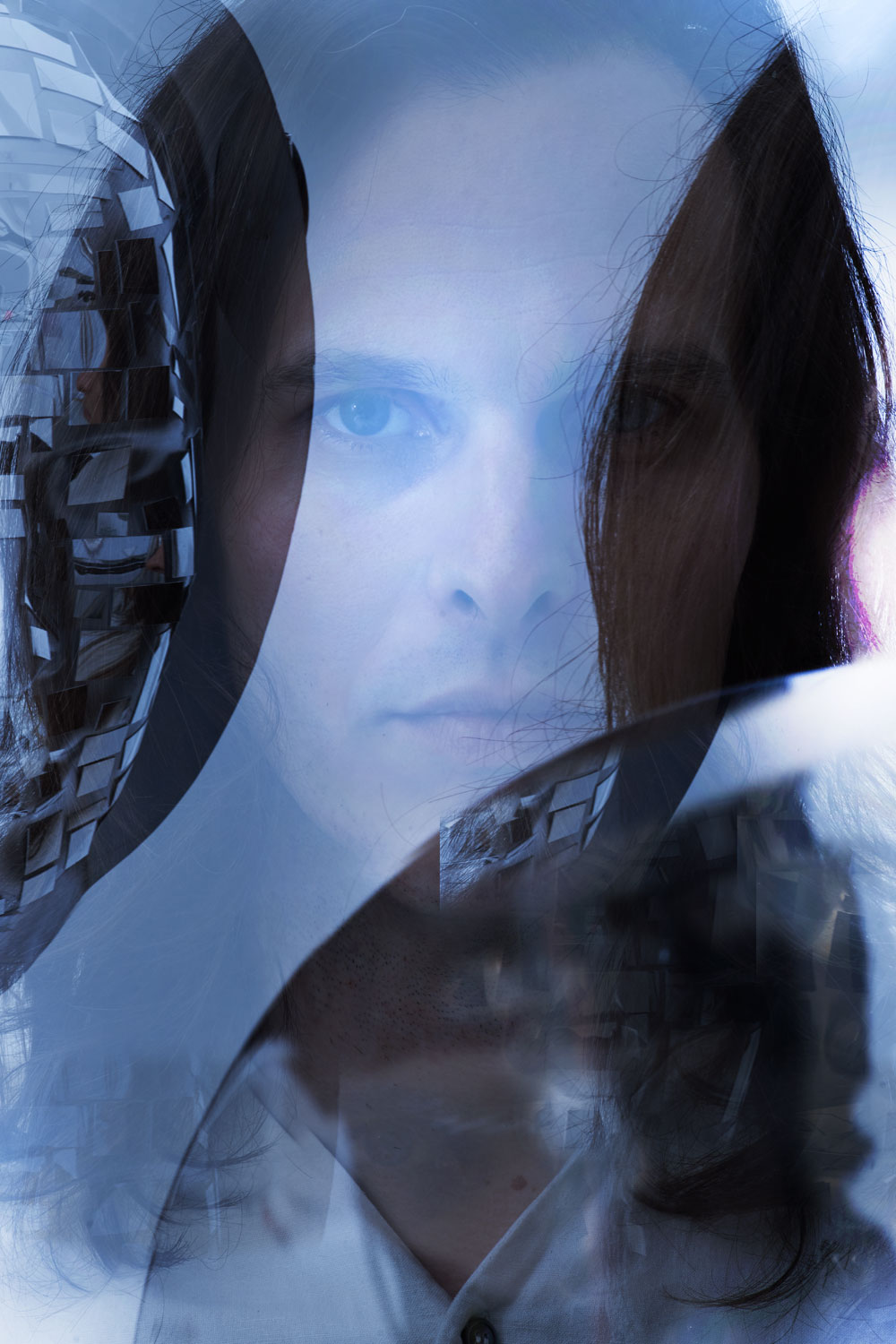Pantha du Prince – The Triad
 Die Triade weist hinaus aus der Enge binärer Oppositionen, digitaler Nullen und Einsen und starrer Gegensätze. Tertium datur: Auf seinem neuen Album „The Triad“ lässt Hendrik Weber alias Pantha du Prince kontrollierte Entweder/Oder-Ordnungen weit hinter sich und öffnet sich auf verschiedene Weise den Unvorhersehbarkeiten sozialer und technischer Interaktion. Die Stücke sind in wechselnden Dreier-Konstellationen mit den Co-Musikern Joachim Schütz, Stephan Abry, Scott Mou, Bendik Hovik Kjeldsberg, Kassian Troyer und Thilo Kuhn entstanden. Statt solitärer Entscheidungen einer Produzenten- und DJ-Figur spielten Improvisation und Empathie dabei eine entscheidende Rolle. Weber hat sich auf einen langwierigen Produktionsprozess eingelassen und das musikalische Milieu jenseits der Ich-Maschine neu organisiert. Nachdem er musikalische Skizzen vorformuliert hatte, wurden diese in kollaborativen Prozessen im Studio des Bandkollektivs Metabolismus auf der Schwäbischen Alb ausgearbeitet. Zustände von Instabilität und Infragestellung waren ausdrücklich erwünscht und machten neue Formen möglich. So wird auch die sture Unterscheidung zwischen Technologie und Natur aufgelöst – im Sinne eines „mechanical romanticism“, wie John Tresh dies in seinem Buch The Romantic Machine: Utopian Science and Technology after Napoleon nennt. Weber hat das Buch während der Aufnahmen gelesen und fand seine eigene Wahrnehmungs- und Produktionsweise darin wieder. In obsessiver Kleinstarbeit wurde das auratische Potenzial der „charismatischen Technologien“ (Tresh) ausgetestet, zum Einsatz kamen mehrere legendäre 70er Jahre-Analog-Synthesizer. Durch das fein austarierte Menschen-Maschinen-Setting ist ein hochauflösender und gesättigter Klang entstanden, der sich opulent und multidimensional ausbreitet. Wie der soziale Prozess wirken die alten Maschinen entschleunigend, Stimmungen und Energiefelder bauen sich langsam auf und kommen als Hook oder atmosphärische Verdichtung oft erst am Ende des Tracks zu sich selbst – ein Verwandlungsgeschick, das an die Vorgehensweise von Arthur Russell erinnert. Über Umwege entfaltet sich eine oft maßlose Euphorie, und das nicht nur in dem programmatischen Stück „You what? Euphoria!“ Der Gestus der Übertreibung wird flankiert von mitreißenden Basslinien, hymnischen Stimmen und – wenn es passt – dem himmlischen Signifier Glocke, zu dem Weber seit seinem Projekt „The Bell Laboratory“ eine besondere Beziehung unterhält. Erstaunlich ist, dass die Musik, obwohl sie unendlich fordernd klingt, doch auch zum beiläufigen Hintergrundhören geeignet ist. Ihre Fülle ist kein Auftrumpfen.
Die Triade weist hinaus aus der Enge binärer Oppositionen, digitaler Nullen und Einsen und starrer Gegensätze. Tertium datur: Auf seinem neuen Album „The Triad“ lässt Hendrik Weber alias Pantha du Prince kontrollierte Entweder/Oder-Ordnungen weit hinter sich und öffnet sich auf verschiedene Weise den Unvorhersehbarkeiten sozialer und technischer Interaktion. Die Stücke sind in wechselnden Dreier-Konstellationen mit den Co-Musikern Joachim Schütz, Stephan Abry, Scott Mou, Bendik Hovik Kjeldsberg, Kassian Troyer und Thilo Kuhn entstanden. Statt solitärer Entscheidungen einer Produzenten- und DJ-Figur spielten Improvisation und Empathie dabei eine entscheidende Rolle. Weber hat sich auf einen langwierigen Produktionsprozess eingelassen und das musikalische Milieu jenseits der Ich-Maschine neu organisiert. Nachdem er musikalische Skizzen vorformuliert hatte, wurden diese in kollaborativen Prozessen im Studio des Bandkollektivs Metabolismus auf der Schwäbischen Alb ausgearbeitet. Zustände von Instabilität und Infragestellung waren ausdrücklich erwünscht und machten neue Formen möglich. So wird auch die sture Unterscheidung zwischen Technologie und Natur aufgelöst – im Sinne eines „mechanical romanticism“, wie John Tresh dies in seinem Buch The Romantic Machine: Utopian Science and Technology after Napoleon nennt. Weber hat das Buch während der Aufnahmen gelesen und fand seine eigene Wahrnehmungs- und Produktionsweise darin wieder. In obsessiver Kleinstarbeit wurde das auratische Potenzial der „charismatischen Technologien“ (Tresh) ausgetestet, zum Einsatz kamen mehrere legendäre 70er Jahre-Analog-Synthesizer. Durch das fein austarierte Menschen-Maschinen-Setting ist ein hochauflösender und gesättigter Klang entstanden, der sich opulent und multidimensional ausbreitet. Wie der soziale Prozess wirken die alten Maschinen entschleunigend, Stimmungen und Energiefelder bauen sich langsam auf und kommen als Hook oder atmosphärische Verdichtung oft erst am Ende des Tracks zu sich selbst – ein Verwandlungsgeschick, das an die Vorgehensweise von Arthur Russell erinnert. Über Umwege entfaltet sich eine oft maßlose Euphorie, und das nicht nur in dem programmatischen Stück „You what? Euphoria!“ Der Gestus der Übertreibung wird flankiert von mitreißenden Basslinien, hymnischen Stimmen und – wenn es passt – dem himmlischen Signifier Glocke, zu dem Weber seit seinem Projekt „The Bell Laboratory“ eine besondere Beziehung unterhält. Erstaunlich ist, dass die Musik, obwohl sie unendlich fordernd klingt, doch auch zum beiläufigen Hintergrundhören geeignet ist. Ihre Fülle ist kein Auftrumpfen.
Und eben immer mit dabei auf „The Triad“: Das Außen und die Anderen, wandernde Masken, andere Stimmen, überwältigende Natureindrücke und alternative Lebensformen. Und so ist denn Hendrik Webers Stimme, die in vier Tracks zu hören ist, nicht als Originalton einer thronenden Sängerfigur zu verstehen, sondern als tool, das Teil eines techno-organischen Prozesses ist und selbst zur „romantischen Maschine“ wird. Die Frage, wie soziale Experimente das Selbst verändern können, beschäftigte Weber auch während eines längeren Aufenthalts an der Villa Aurora in Los Angeles. An der Westküste begab er sich auf die historischen Spuren alternativer Lebensgemeinschaften und fand dort konkrete Utopien vor, die ihn selbst noch als gescheiterte inspirierten und mit der Frage konfrontierten, wie autarke Strukturen möglich sind, nicht zuletzt in der Musik. Um es mit angemessenem Pathos zu sagen: Auf „The Triad“ lässt der „mechanische Romantiker“ solche konkreten Utopien neu erklingen. Pantha du Prince zeigt uns den Weg in künstliche Paradiese. Wenn wir vom Weg abkommen und uns im Nebel verirren sollten, macht das alles noch viel besser.
Aram Lintzel, Februar 2016
 Pantha du Prince – “The Triad” (en)
Pantha du Prince – “The Triad” (en)
The triad promises to help us shed the straitjacket of binary oppositions, of digital zeroes and ones, of rigid antinomies. Tertium datur: on his new album “The Triad,” Hendrik Weber a.k.a. Pantha du Prince breaks out of the dispensation of carefully calculated either-or choices, opening his work to the unpredictable serendipity of social and technological interaction in more than one way. He collaborated with Joachim Schütz, Stephan Abry, Scott Mou, Bendik Hovik Kjeldsberg, Kassian Troyer, and Thilo Kuhn, working in a different constellation of three musicians for each track. Rather than monopolizing control over the project like so many producers and DJs, Weber allowed himself to rely on improvisation and empathy and embraced an inevitably time-consuming production process. He shut down the ego machine by reorganizing the setting of musical creativity. Drafts for several tracks in hand, he and his collaborators withdrew to the southwest German countryside to flesh out his sketches in the studio operated by the band collective Metabolismus. He explicitly encouraged states of instability and challenging questions to make new forms possible. The results also dismantle the entrenched distinction between technology and nature in favor of something like what John Tresh, in his book The Romantic Machine: Utopian Science and Technology after Napoleon, has called “mechanical romanticism.” Weber read the book during the recording phase and thought it captured his own perceptions and approach to music-making. Obsessively tinkering with the details, the musicians probed the quasi-magical potential of the “charismatic technologies” (Tresh) at their disposal; among their equipment were several legendary analog synthesizers from the 1970s. The delicately balanced human-technological ensemble has engendered a rich yet fine-grained and opulently multidimensional sound. Like the social process, the old machines have had a decelerating effect; moods and energy fields gradually emerge and often do not come into their own as hooks or compact atmospheric elements until the end of a track – the skill with which the musicians perform such transformations recalls Arthur Russell’s work. In many songs, and not just the programmatic “You what? Euphoria!”, the exploration of musical byways builds up to a boundless elation. The gesture of excess is flanked by rousing bass lines, hymnlike voices, and, where appropriate, bells—ever since his project “The Bell Laboratory,” this heavenly signifier has been especially dear to Weber’s ear. Strikingly, the music, though it solicits an infinitely acute attention, rewards the casual listener as well. Its acoustic abundance is meant to welcome, not intimidate.
And then “The Triad” always also lets us hear the outside world and those others: migrant masks, different voices, dazzling natural impressions, alternative forms of life. So when Hendrik Weber’s own voice is featured on four tracks, that does not make it the original sound of a commanding lead singer. It is a tool among others, an element in a techno-organic process, and turns out to be a “romantic machine” in its own right. Weber had previously explored the question of how social experiments can change the self during an extended residency at Villa Aurora in Los Angeles. Traveling the West Coast in search of the traces of historic alternative communities, he encountered physical manifestations of utopian visions that inspired him even in their present ruined state, prompting reflections on how autarkic structures are possible, in music as elsewhere. To put it with all due solemnity: with “The Triad,” the “mechanical romantic” has brought back the sound of such real utopias. Pantha du Prince shows us the way to artificial paradises. And if we go astray and become lost in the fog: so much the better.
Aram Lintzel, February 2016